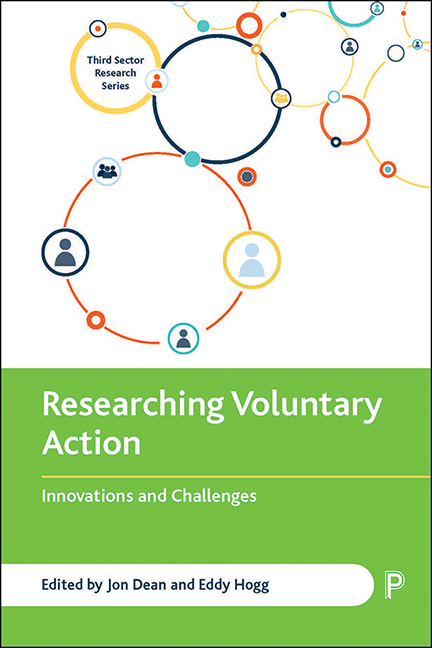Book contents
- Frontmatter
- Contents
- List of figures, tables and boxes
- Notes on contributors
- Acknowledgements
- Series editor’s foreword
- 1 Introduction
- 2 (Un)suitable methods and reflexive considerations: an interview and focus group study of youth volunteering
- 3 Interpretive ethnography: a UK charity shop case study
- 4 Collaborative philanthropy and doing practically relevant, critical research
- 5 Peer research: co-producing research within the context of voluntary and community action
- 6 Charity advertising: visual methods, images and elicitation
- 7 Using archives and objects in voluntary action research
- 8 Using Mass Observation as a source of qualitative secondary data for interdisciplinary longitudinal research on voluntary action
- 9 Investigating meanings and messages on volunteering through television media
- 10 Annual reporting in voluntary organisations: opportunities for content analysis research
- 11 Researching risk in the voluntary sector: the challenges and opportunities of regulatory data
- 12 Exploring the benefits of volunteering: combining survey and administrative data in the Nordic ‘laboratory’
- 13 Spatial approaches to the voluntary sector
- 14 Restudies, surveys and what counts as volunteering
- 15 Conclusion
- References
- Index
9 - Investigating meanings and messages on volunteering through television media
Published online by Cambridge University Press: 15 September 2022
- Frontmatter
- Contents
- List of figures, tables and boxes
- Notes on contributors
- Acknowledgements
- Series editor’s foreword
- 1 Introduction
- 2 (Un)suitable methods and reflexive considerations: an interview and focus group study of youth volunteering
- 3 Interpretive ethnography: a UK charity shop case study
- 4 Collaborative philanthropy and doing practically relevant, critical research
- 5 Peer research: co-producing research within the context of voluntary and community action
- 6 Charity advertising: visual methods, images and elicitation
- 7 Using archives and objects in voluntary action research
- 8 Using Mass Observation as a source of qualitative secondary data for interdisciplinary longitudinal research on voluntary action
- 9 Investigating meanings and messages on volunteering through television media
- 10 Annual reporting in voluntary organisations: opportunities for content analysis research
- 11 Researching risk in the voluntary sector: the challenges and opportunities of regulatory data
- 12 Exploring the benefits of volunteering: combining survey and administrative data in the Nordic ‘laboratory’
- 13 Spatial approaches to the voluntary sector
- 14 Restudies, surveys and what counts as volunteering
- 15 Conclusion
- References
- Index
Summary
Introduction
Pop culture messages, specifically those on television, shape our perceptions of the activities taking place in the real world. We absorb cultural messages each time we engage with media. Television and movies have been used to teach leadership through Game of Thrones (Yu and Campbell, 2020), ethical decision making through The Good Place and The Avengers (Bharath, 2019; Meyer, 2020) and the ins and outs of local government through Parks and Recreation (Borry, 2018). Similar to Pautz's analysis of US government portrayed across Academy Award-winning films (2017), I looked broadly across television series to discover how volunteering is portrayed and the messages we absorb. A dataset of 131 television storylines of volunteering was developed for two analyses: one exploring what volunteer managers can learn from television portrayals, and the second capturing the paradox of coercive or mandatory volunteering.
Television messages offer more uniformity and longitudinal consistency than other pop culture messaging, such as social media and film, because they offer space for character development, and characters have a greater number of experiences. Television storylines as data allow us to capture multiple views of a single voluntary act or series of acts from the volunteer, the volunteer supervisor and the beneficiary. We can also observe the volunteers’ discussions with friends and family and their inner monologues. These conversations provide us the opportunity to view and interpret the voluntary act itself.
Television provides insight into how society views volunteering and is an interpretive, and even fun, way to study behaviour (McKee, 2003). Television storylines offer multiple avenues to explore the motivations and intentionality in voluntary actions. For instance, characters engaging in coercive volunteering portrayed multidimensional layers of motivations for completing their hours. The motivations moved beyond compulsory to include instrumental, civically oriented and sometimes nefarious impulses. Volunteers are portrayed as driven by complex internal reasoning rather than external incentives and consequences. Of course, these are fictional stories, but the messages reflect societal understandings of volunteering. We mimic and expect what we observe in pop culture messaging in real life (Gerbner et al, 1986; Appel, 2008). To complete an ethnographic study with human subjects at the same scale would require a large amount of time, an enormous research team and hundreds of subjects. Ample participation in such an endeavour is unlikely.
- Type
- Chapter
- Information
- Researching Voluntary ActionInnovations and Challenges, pp. 96 - 109Publisher: Bristol University PressPrint publication year: 2022



